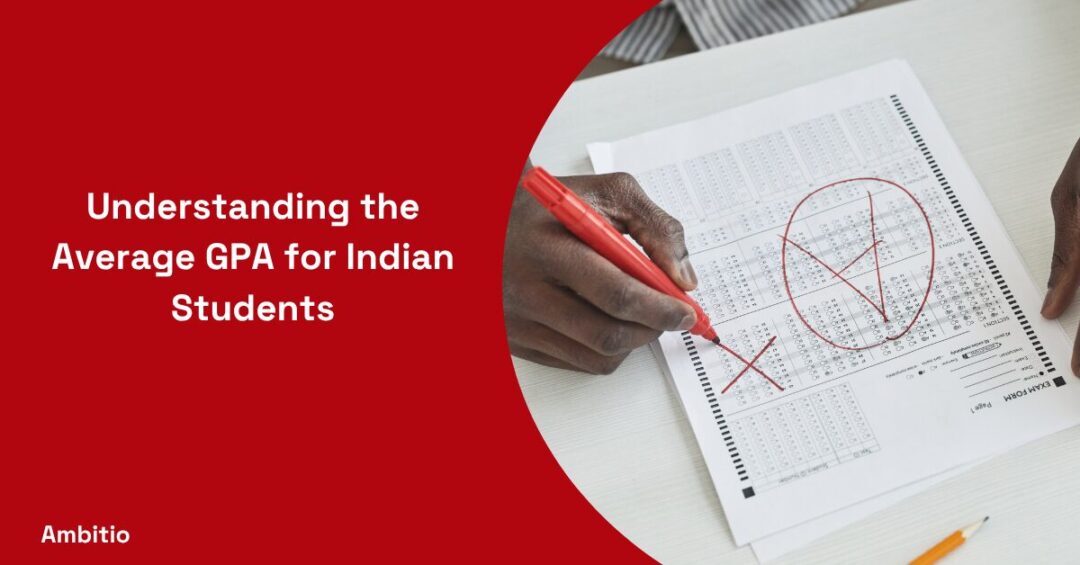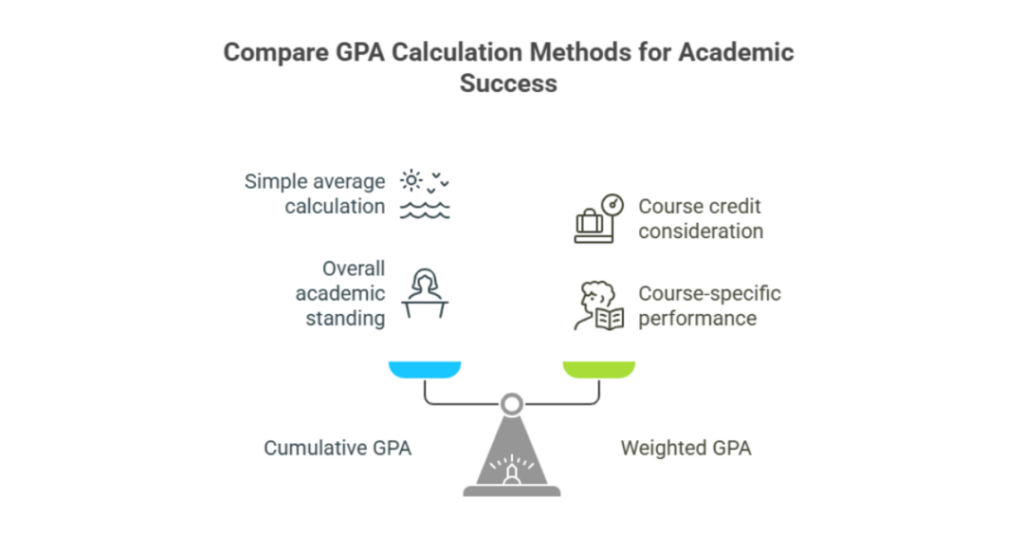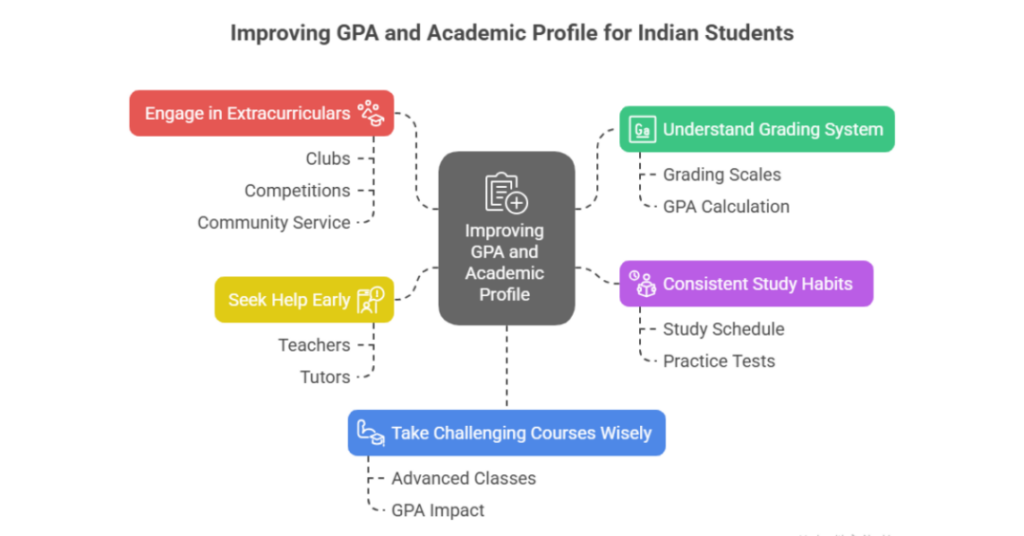31 May 2025
6 minutes read
Understanding the Average GPA for Indian Students

Key Takeaways:
- Average GPA conversion from Indian percentage grades to the 4.0 scale is crucial for accurate admissions evaluation.
- A GPA of 3.5 or higher greatly enhances scholarship chances and university acceptance.
- Consistent study habits and early help are vital for Indian students to improve GPA and academic standing.
Did you know that the average GPA plays a key role in college admissions, especially for Indian students aiming for US universities? Many struggle to calculate their GPA accurately because high schools in India use percentage grades, which don’t directly translate to the familiar 4.0 scale. This creates confusion and affects scholarship and admission chances.
Understanding how to convert your grades and maintain a good GPA is crucial. By learning the grading system and how GPA is calculated, Indian students can improve their academic profile realistically and boost their chances in competitive admissions.
What is GPA and Why Does It Matter for Indian Students?
GPA, or Grade Point Average, is a numerical representation of your academic performance on a 4.0 scale. For Indian students, understanding how to calculate your GPA score, whether cumulative, weighted, or unweighted, is essential since many Indian high schools use percentage grades rather than letter grades.

The average GPA is calculated by translating these grades into numerical values and dividing by the total number of credits. A good high school GPA, typically 3.0 or above, plays a key role in college admissions, especially for US universities and Ivy League schools. Maintaining or improving your GPA can significantly impact scholarship opportunities and admission chances.
What is the Average GPA Among Indian Students?
Understanding the overall GPA of Indian students is crucial, especially when applying to universities abroad that use the 4.0 GPA scale. Indian high schools typically use percentage grades, which are translated into numerical values and letter grades to calculate GPA.
Admissions officers at top academic institutions carefully look at your GPA criteria, as it plays a key role in the admissions process, scholarship for international students, and financial aid decisions.
| GPA Range | Description | What It Means for Indian Students |
|---|---|---|
| 4.0 | Perfect GPA | Top grade, rarely achieved, considered excellent |
| 3.5 – 4.0 | High GPA | Good GPA in high school, competitive for Ivy League |
| 3.0 – 3.5 | Average to Above Average | B average, meets minimum GPA criteria for many schools |
| Below 3.0 | Low GPA | May require improvement, could impact admissions |
Calculating your GPA by averaging your grades and the number of credits is important to understand where you stand. Since grading scales vary from school to school, Indian students must research colleges’ GPA Grading system and practice tests to maintain or improve their GPA. GPA matters because admissions officers are looking for students with a strong academic record, and a higher GPA often increases chances of admission and financial aid.
How to calculate an average GPA?
Calculating your average GPA is an essential step for Indian students preparing for college applications, especially since many high schools and colleges use different grading scales.
Whether it’s your cumulative GPA from high school or college GPA on a 4-point scale, understanding how to calculate it accurately can impact your college search and admissions chances. We can also use the GPA Calculator.
Step-by-Step Method to Calculate Average GPA:
- Collect Your Grades and Credits:
Gather all the letter grades or percentage grades you have received. Many high schools translate grades to the 4.0 scale by converting letter grades or percentage grades to numerical values. - Translate Grades to the 4.0 GPA Scale:
For example, an A or 90–100% equals a 4.0 GPA, a B or 80–89% equals around 3.0 GPA, and so on. Many schools use a weighted or unweighted GPA system, so check how your school calculates this. - Multiply Each Grade by Its Credit Value:
Since schools may assign different credit hours per course, multiply each course’s GPA value by its number of credits. - Add the Results:
Sum all the grade points earned for each course. - Divide by Total Number of Credits:
Divide the sum of grade points by the total number of credits taken. This gives you your cumulative GPA or average high school GPA.
Example:
| Course | Grade | GPA Value | Credits | Grade Points (GPA × Credits) |
|---|---|---|---|---|
| Math | A | 4.0 | 3 | 12.0 |
| English | B | 3.0 | 3 | 9.0 |
| History | A- | 3.7 | 4 | 14.8 |
| Science | B+ | 3.3 | 3 | 9.9 |
- Total Grade Points: 12.0 + 9.0 + 14.8 + 9.9 = 45.7
- Total Credits: 3 + 3 + 4 + 3 = 13
- Average GPA: 45.7 ÷ 13 ≈ 3.52
What is an Unweighted GPA and a weighted GPA?
GPA is important for Indian students, especially when researching colleges that use different GPA systems. An unweighted GPA measures academic performance on a standard 4.0 scale, where all classes are valued equally regardless of difficulty. For example, a 3.0 GPA represents a B average, while a 3.5 GPA or higher is considered good.
In contrast, a weighted GPA accounts for course difficulty, such as honors or AP classes, often allowing GPAs above 4.0. Since grading scales vary college to college, admissions officers look closely at the types of GPA and grades you receive, translating letter grades into numerical values. Many universities require a minimum GPA, so understanding GPA vs percentage grading is key for Indian students aiming for top schools.
What is Considered A Good GPA?
For Indian students, understanding what constitutes a good GPA is crucial during your high school career. A GPA of 3.0 is often seen as the minimum, but many universities prefer admitted students to have a GPA of 3.5 or higher. Since grading scales differ, grades and letter grades are translated into numerical values on a 4.0 scale.
Admissions officers also look at your overall GPA, not just individual grades. A higher GPA is important because it reflects consistent academic performance and improves your chances at competitive colleges.
How Does the Average Grade Point Average Influence College Admission for Indian Students?
The average GPA is important for Indian students because universities take into account both grades as well as numerical scores when evaluating applications. Since high schools use different scales, a lower GPA in one system might be equivalent to a higher score elsewhere.
Admissions officers look closely at your high school’s grading scale and how your GPA compares to the average score of admitted students. Maintaining a GPA between 3.5 and 4.0 improves your chances, as GPA is also a key factor alongside other criteria for both high school and college students during the admissions process.
Tips for Indian Students to Improve Their GPA and Academic Profile
For Indian students, a strong GPA is important as it directly impacts college admissions and scholarship opportunities. While the average GPA works as a baseline, improving your GPA and overall academic profile can significantly boost your chances at competitive universities.

Here are some practical tips to help you raise your academic performance:
Understand Your Grading System
Knowing how your grades are translated into the GPA scale helps you identify where you stand. Different schools use varied grading scales, so understanding this will allow you to focus on improving areas that affect your average GPA the most.
Prioritize Consistent Study Habits
GPA is important because it reflects sustained effort across subjects. Create a study schedule that allows regular revision and practice tests to maintain steady academic growth rather than last-minute cramming.
Seek Help Early
Don’t wait to address difficulties in subjects where your grades may be lower. Getting help from teachers or tutors early can prevent a lower GPA and improve your cumulative academic record.
Take Challenging Courses Wisely
While a weighted GPA might not always apply, taking advanced classes where possible demonstrates academic rigor. However, balance this to ensure your average GPA doesn’t suffer from overly difficult courses.
Engage in Extracurriculars and Projects
A strong academic profile is more than just GPA. Participating in clubs, competitions, or community service shows leadership and commitment, which colleges also value alongside your grades.
By following these tips, Indian students can enhance their GPA and present a competitive academic profile to admissions officers worldwide.
Conclusion
Understanding and improving your average GPA is a crucial step for Indian students aiming to study abroad. Your GPA not only reflects your academic abilities but also plays a key role in admissions and scholarship decisions.
Navigating different grading systems and boosting your profile can be challenging, but you don’t have to do it alone. At Ambitio, we specialize in personalized profile building that highlights your strengths and maximizes your chances at top universities worldwide.
Ready to turn your GPA into your greatest asset? Join Ambitio today and let’s craft your success story together!
FAQs
What is a good GPA?
A good GPA typically falls in the range of 3.5 to 4.0, but it may vary depending on your academic goals and the competitiveness of your chosen institution.
Can I improve my GPA in college?
Yes, you can improve your GPA in college by implementing effective study strategies, seeking help when needed, and staying committed to your academic goals.
Do all high schools use a 4.0 GPA scale?
No, not all high schools use a 4.0 GPA scale. Some schools use different scales or grading systems, so it’s essential to understand your school’s specific grading system.
Are there different types of GPA?
Yes, there are various types of GPA, such as unweighted GPA, weighted GPA, and cumulative GPA, each serving different purposes in the academic world.
How do universities consider GPA in admissions?
Universities take GPA into account during the admissions process to assess an applicant’s academic capability. However, GPA is just one of many factors considered in the overall application.
What is the average GPA in U.S. high schools?
The average GPA for U.S. high school students is around 3.0, which is considered a B average.
What is considered a good average GPA for college admissions?
A good average GPA for competitive college admissions is typically 3.5 or higher, though top universities often expect an average GPA close to 3.9 or above.

You can study at top universities worldwide!
Get expert tips and tricks to get into top universities with a free expert session.
Book Your Free 30-Minute Session Now! Book a call now




























